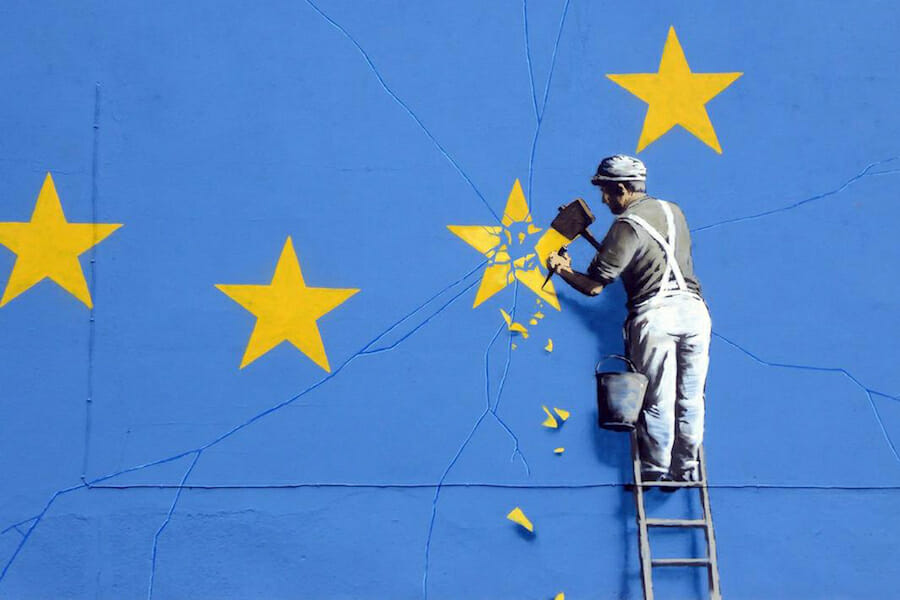
The EU Deficit is Ideational, not Democratic
The European Union (EU) seems unable to escape its current state of perpetual crisis. The attack of nationalist forces seems to have damaged the legitimacy of its institutional framework in the eyes of many citizens. Support for these forces keeps growing across Europe, and many of their leader’s names — Nigel Farage, Geert Wilders or Marine Le Pen, among others — sound already familiar to many Europeans. The nationalist tidal wave keeps growing and Europe does not seem to be able to stop it. What is driving its growth? Is the EU responsible?
Many experts point out the financial crisis of 2008 as a springboard for many of these political parties, but a handful of these parties already existed when the crisis hit the low and middle-income classes in Europe. Despite this, many liberals believe the current state of the EU project is — to a great extent — due to the gloomy mood of the member economies. Thus, if growth rates increase –and unemployment decreases as a consequence– the political climate will change and support for the majority of these parties will plummet. This view, however, often forgets to analyze how economic growth is (unequally) distributed and the long-term political impact of these phenomenon.
“It’s the economy, stupid”
Nevertheless, the views of many critical economists and liberals do not differ significantly when it comes to analyzing the reasons behind the growth of populism in the Union. The popular phrase coined by Bill Clinton’s campaign strategist, James Carville — “It’s the economy, stupid” — is subtly present in many of the most conventional analyses of the societal impact of the crisis. There are, however, more reasons that explain this phenomenon other than temporary material constraints or additional challenges for the EU project besides the economy.
Among critical economists, there is a general consensus that the rigorous — and sometimes inflexible — EU ‘medicine’ aimed at addressing the economic crisis became the fuel that propelled much of the success of parties that opposed the economic measures of the European Commission. The proposed ‘remedies’ to fix the European economy created a bigger political problem with new economic implications. Whilst this is a reasonable analysis, it’s just half of the story. In my view, the challenges of the EU project are not (or not only) due to the material inequality generated by the latest crisis, but linked to structural problems and ideational conflicts that have not been resolved yet.
If material inequalities were the main or only reason behind the growth of national populist forces, it would be impossible to explain why much of the support for these parties comes from middle to high-income groups. Therefore, ideational variables can’t be neglected in the analysis.
The Eurobarometer, a periodical survey of EU citizens, has been pointing out for many years that a majority of EU citizens have the impression that their views are not being considered in the decision-making process. There is undoubtedly room for improvement in the way the EU functions. The democratic institutional system of the EU is genuinely complex, in part because of the many checks and balances as well as consensus rules that have been established to increase mutual accountability (Moraticsik, 2003, pp. 605–606). One might, therefore, say, a considerable part of the criticism the EU receives is not based on how it actually works.
This could be partially due to the fact that the ideas and impressions citizens have of the functioning of the EU are not only a consequence of what actually happens in the institutions, but what is said to have happened. Since citizens delegate their representation, their notion of the EU comes through preconceived ideas — a social construct consequence of populist narratives. This is incentivized by social media ‘echo chambers,’ which help create the impression that one’s opinion is the one and only truth. In many ways, the success of the Euro-skeptic narrative across Europe is also a consequence of decades of minimal institutional communication efforts.
Considering the complexity of the EU system and the difficulties associated with citizen engagement at an intergovernmental level, it comes as no surprise that turnout for European Parliament (EP) elections has been falling since the first direct election in 1979. In the last elections in 2014 turnout hit a new low at 42.6%. Moreover, despite the efforts to strengthen the power of the EP within the EU system, turnout is not expected to grow significantly in the upcoming elections in 2019. Again, the gap between what happens and what’s thought to be happening is fueling a Euro-skeptic narrative that pretends to revert the integration of policy and decision-making processes by delegitimizing the EU institutions. Are EU institutions discussing topics that are relevant to citizens? For the most part, yes. Do EU citizens have that impression? Polls say they do not.
EU leaders have many challenges ahead: Brexit, relations with the US, the recent macroeconomic slowdown of the Eurozone or incentivizing citizen participation in elections are among their priorities. Yet, the most important challenge is to create a cohesive and coherent political narrative that fills the communicative vacuum that populist narratives are filling in with half-truths and blatant lies.
What is the purpose of the EU? How is the EU making their lives better? Citizens of all ages and socioeconomic conditions need to be able to answer these questions. Brexit, despite all its negative political and economic implications, offers a great opportunity for the EU to contrast two models: democratic union, interdependency and open borders against facing globalization alone. It’s time to tell the story.

